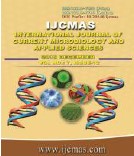


 National Academy of Agricultural Sciences (NAAS)
National Academy of Agricultural Sciences (NAAS)

|
PRINT ISSN : 2319-7692
Online ISSN : 2319-7706 Issues : 12 per year Publisher : Excellent Publishers Email : editorijcmas@gmail.com / submit@ijcmas.com Editor-in-chief: Dr.M.Prakash Index Copernicus ICV 2018: 95.39 NAAS RATING 2020: 5.38 |
The field experiment was conducted at the Central Research Farm of Bidhan Chandra Krishi Viswavidyalaya, Gayeshpur, in of West Bengal to study the effect of drip fertigation on the physico-chemical properties viz. pH, electrical conductivity and organic carbon of an alluvial soil and its impact on yield of banana during the year 2012 and 2013. The fertigation was done at four evapotranspiration (ET) based irrigation levels (D1=0.6 ETo, D2=0.8 ETo, D3=1.0 ETo for drip and surface irrigation (S) at IW/CPE 1.0) and at three fertilizer levels of recommended doses of fertilizer (RDF) viz., F1=60% RDF, F2=80% RDF and F3=100% RDF. The experiment was laid out in the factorial randomized block design with three replications. After the fertigation experiment the soil pH decreased with increasing irrigation levels and fertilizer doses, but statistically non-significant. The values obtained were 6.81, 6.77, 6.75 and 6.75 for irrigation levels viz. D1, D2, D3 and S, respectively. The corresponding values for fertilizer doses were 6.75, 6.76 and 6.76 for F1, F2 and F3, respectively. The highest pH value was recorded in the combination of D1F3 (6.76) and lowest value in SF1 (6.19). At the end of irrigation cycle, the drip irrigation showed a slightly higher soil EC in comparison to surface irrigation. The effect of drip irrigation on soil OC was found to be significant. Increasing fertilizer doses tend to increase the organic carbon to the extent of 0.61, 0.63 and 0.64% under F1, F2 and F3, respectively. Among the interactions, D3F3 recorded the highest increase in OC (0.67%) followed by D2F2, D2F3 and D2F3 showing almost equal value (0.65%). So, the soil pH and EC does not get affected by the drip fertigation using urea, DAP and MOP but it is for soil organic carbon.
 |
 |
 |
 |
 |